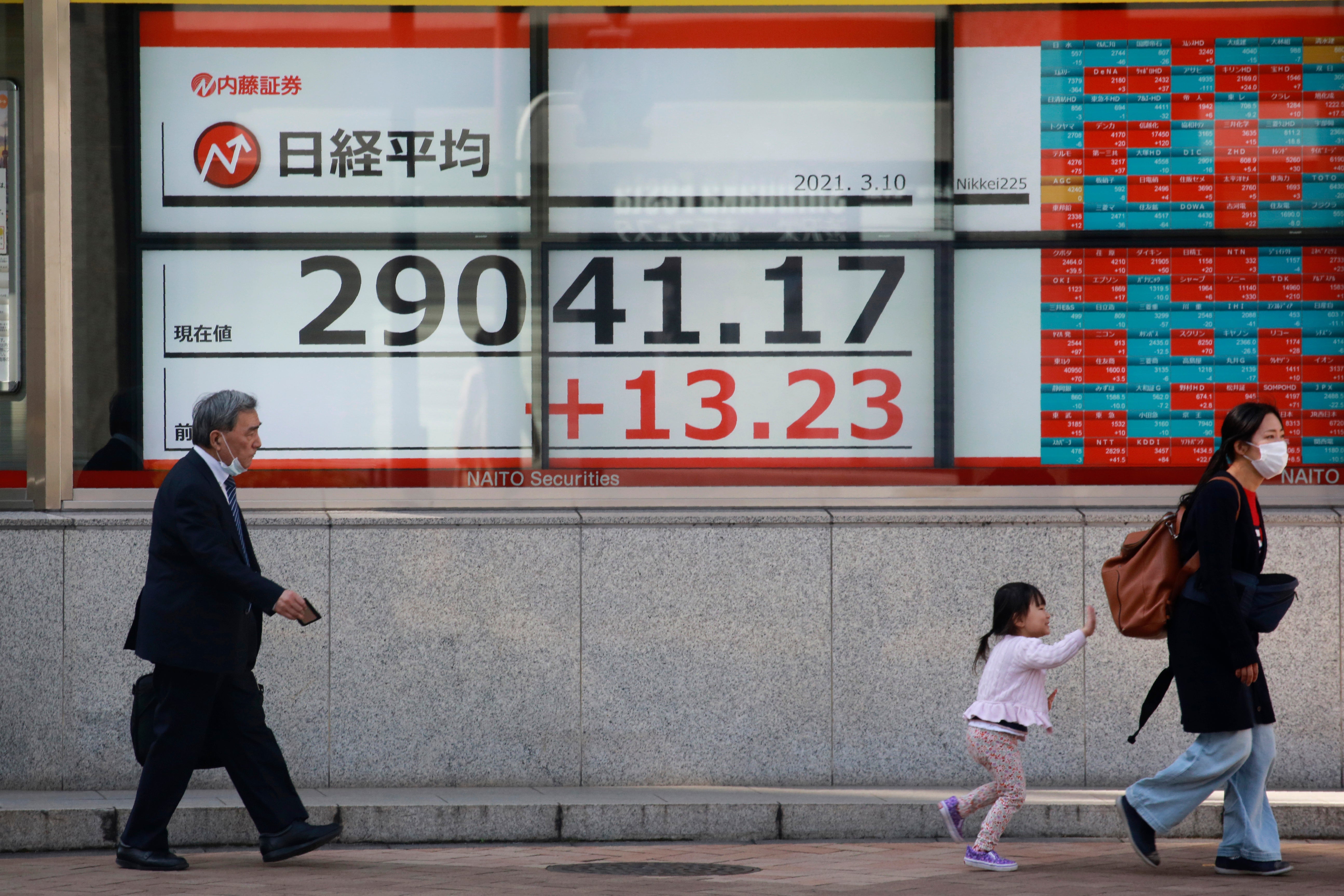Asian stocks follow Wall Street higher after tech rally
Asian stocks have followed Wall Street higher following a rally for major tech companies

Your support helps us to tell the story
From reproductive rights to climate change to Big Tech, The Independent is on the ground when the story is developing. Whether it's investigating the financials of Elon Musk's pro-Trump PAC or producing our latest documentary, 'The A Word', which shines a light on the American women fighting for reproductive rights, we know how important it is to parse out the facts from the messaging.
At such a critical moment in US history, we need reporters on the ground. Your donation allows us to keep sending journalists to speak to both sides of the story.
The Independent is trusted by Americans across the entire political spectrum. And unlike many other quality news outlets, we choose not to lock Americans out of our reporting and analysis with paywalls. We believe quality journalism should be available to everyone, paid for by those who can afford it.
Your support makes all the difference.Asian stock prices followed Wall Street higher on Wednesday following a rally for major tech companies.
Shanghai Tokyo and Hong Kong advanced. South Korea retreated.
Wall Street's benchmark S&P 500 index closed up 1.4%, led by gains for Apple, Amazon and other tech majors. The Nasdaq composite index, dominated by tech shares, surged 3.7% for its biggest gain in four months.
Markets have been adjusting to a rise in long-term interest rates in the bond market, which has pulled money out of stocks. A reversal in bond market trends at least temporarily sent investors back to companies they hope will thrive after the coronavirus pandemic ends.
The swing shows "how fragile sentiment has become, driven by the absolute uncertainty” about the outlook for interest rates and inflation, said Stephen Innes of Axi in a report.
The Shanghai Composite Index rose 0.7% to 3,381.84 and the Nikkei 225 in Tokyo advanced 0.3% to 29,106.84. The Hang Seng in Hong Kong added 0.5% to 28,9904.00.
The Kospi in Seoul lost 0.6% to 2,957.54 while Australia's S&P-ASX 200 slid 0.4% to 6,745.60.
India's Sensex opened up 0.4% at 51,229.28. New Zealand and Indonesia rose while Singapore retreated.
On Wall Street, the S&P 500 rose Tuesday to 3,875.44. Communication companies and those that rely on consumer spending contributed to the increase. Financial, energy and industrial stocks lagged the broader market.
Apple rose 4.1%, chipmaker Nvidia climbed 8% and Tesla jumped 19.6% for the biggest gain in the S&P 500.
The Dow Jones Industrial Average which is weighted less toward tech, rose 0.1% to 31,832.74.
The Nasdaq advanced to 13,073.82. Despite that, the index is 7.2% below its Feb. 12 high. On Monday it closed 10% below its peak in what is known as a correction on Wall Street.
Some of the big technology stocks that fueled last year's market rebound after the coronavirus outbreak upended the global economy have been shedding gains since the Nasdaq peak on Feb. 12.
Apple was down 14% through the end of last week.
Financial sector stocks, which had benefited from the rise in bond yields, were the biggest decliners Tuesday. Bank of America fell 2.2%, while American Express slid 3.4%. Banks and credit card issuers tend to do well when interest rates are rising because they can charge higher rates.
Bond yields, or the difference between a bond's market price and the payout at maturity, have been widening due to rising expectations for growth and the inflation that could follow. Inflation erodes the value of that future bond payout, encouraging investors to shift to stocks.
The fall in bond prices drew investors who didn't want to pay high prices for stocks, especially tech stocks that looked most expensive.
Investors are betting the $1.9 trillion in coming government stimulus will help lift the U.S. economy out of its coronavirus-induced malaise. The package set for final approval in the U.S. House on Wednesday provides direct payments of up to $1,400 for most Americans and extends emergency unemployment benefits that help to support consumer spending, the economy's main engine.
In energy markets, benchmark U.S. crude lost 49 cents to $63.52 per barrel in electronic trading on the New York Mercantile Exchange. The contract sank $1.04 on Tuesday to $64.01. Brent crude, used to price international oils, declined 61 cents to $66.91 per barrel in London. It retreated 72 cents the previous session to $67.52.
The dollar rose to 108.83 yen from Tuesday's 108.47 yen. The euro declined to $1.1878 from $1.1901.